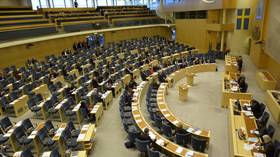Swedish media angry over new espionage law

Sweden’s new espionage law poses a danger to the nation’s democracy by making investigative journalism much more difficult, some local outlets and media workers have suggested.
The new legislation was supported by parliament on Wednesday amid demands by Türkiye that Sweden stop supporting Kurdish “terrorists” as a condition for allowing it to enter NATO.
The new law introduces crimes of “disclosing secret information in international cooperation,” “foreign espionage” and “aggravated foreign espionage.” The latter may carry a prison sentence of up to eight years.
Swedish Prime Minister Ulf Kristersson spoke in favor of the legislation, arguing that it would make it easier for Stockholm to work together with its international partners. He also insisted that the move “is not about constraining the work of journalists, but about an express will to hurt these interests.”
However, several media outlets, including national broadcasters SVT and Sveriges Radio, noted that the law “threatens democracy and freedom of speech.” This sentiment was echoed in a joint public letter by Swedish media workers released last week.
The bill, they said, “risks having an inhibitory effect on whistleblowers and other important sources for investigative journalists.” It can also have “huge consequences” for reporting on Sweden’s participation in such international organizations as the UN and NATO.
In May, Sweden, along with its Nordic neighbor Finland, applied to join NATO, citing Russia’s military operation in Ukraine as the reason. Their membership bid, however, was initially opposed by Türkiye, with President Recep Tayyip Erdogan claiming in late May that the two countries support Kurdish “terrorism.” Later, all three parties signed an agreement addressing Ankara’s concerns. Negotiations on the matter are still underway, with Türkiye, as well as Hungary, yet to ratify the Nordic states’ applications.
Commenting on Finland and Sweden’s NATO bid, Kremlin Spokesman Dmitry Peskov warned in June that the move would not contribute to Europe’s security but instead further escalate tensions between Moscow and the West.













